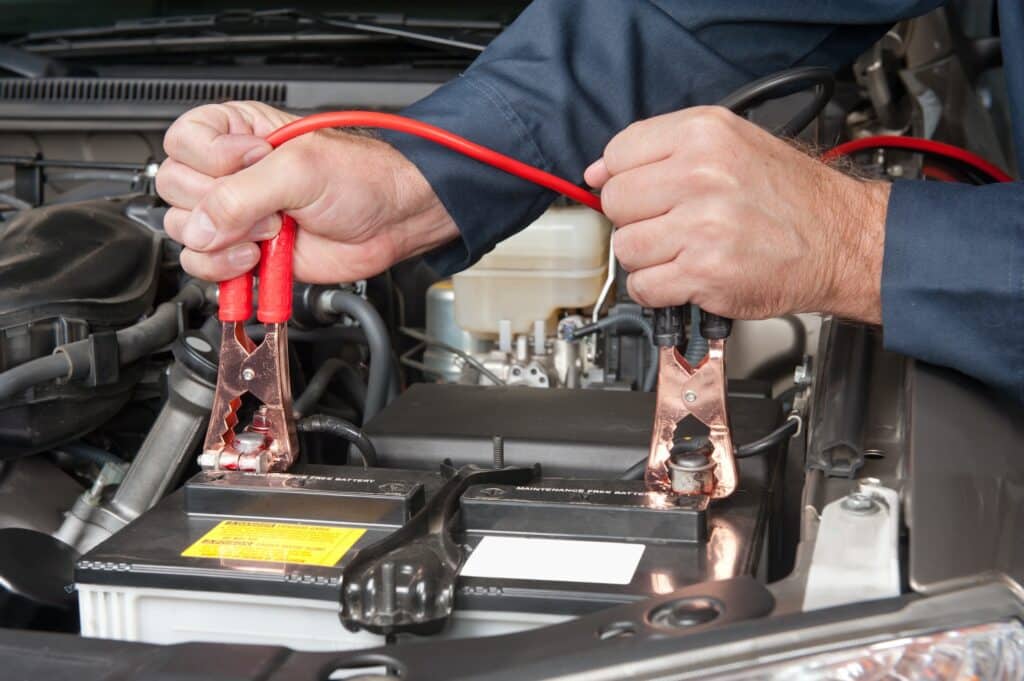Today, we aim to demystify a critical issue about your vehicle’s maintenance – the lifespan of your car battery. This is a fundamental aspect of maintaining the optimal performance of your vehicle. The complex nature of cars and myriad factors influencing this topic often make it challenging to settle on a definitive timeline; nonetheless, understanding an estimate can go a long way in proactive maintenance before the battery needs replacing. Let’s navigate the intricacies of vehicle battery life and explore the steps to maximise its longevity. One quick warning: changing a battery you self can cause more issues than its worth; if you are considering changing it always seek professional advice to make sure you are not going to do more damage ideally, just go to the garage in the first place to get it replaced, ok where were we…
How Long Does a Car Battery Last and What Factors Affect Battery Lifespan?

Car batteries last between three and six years on average, but many factors affect a battery’s lifespan. How long car batteries last depends mainly on your driving habits, the climate, and your vehicle’s charging system. It’s not uncommon to get up to five or six years out of a battery in a car driven daily in a temperate climate with a properly functioning charging system. However, a battery used occasionally may only last for a short time.
A battery’s lifespan is typically between three and six years, though some people have reported their battery lasting for three or more years with proper care and maintenance. How long a car battery lasts could also be influenced by conditions, such as excessive heat or cold, which can reduce a battery’s effectiveness and shorten its life. A well-maintained battery can last much longer if used in ideal conditions.
In conclusion, while predicting precisely how long a battery will last is impossible, you can extend your battery’s lifespan as much as possible. By ensuring your charging system is functioning correctly, limiting short trips that prevent your battery from fully charging, and protecting it from extreme temperatures, you can get the most out of it and potentially extend its life beyond the typical three-to-six-year range.
Relevance of Vehicle Battery: Taking into account how a Battery in a Car would Affect its Lifespan
The relevance of a vehicle battery cannot be understated. It’s the powerhouse of the vehicle, ensuring that all the electrical components of the car function optimally. However, the durability of a car battery depends on several factors, and it’s crucial to understand these factors to know how long a car battery should last.
Traditionally, a car battery should last between 5 to 7 years under optimal conditions. But this isn’t always the case; the lifespan can be much less often. The battery powers all the electrical systems, and this constant demand can take a toll on its lifespan. Numerous factors can affect a car battery’s durability, such as the vehicle’s overall condition, driving habits, and environmental factors.
Extreme temperatures, for example, can cause significant wear and tear, resulting in the vehicle battery needing an earlier replacement. Cold weather can slow down the chemical reactions within the storm, while extreme heat can speed them up, leading to the premature death of a car battery.
At SME, we understand the relevance of a vehicle battery and how its lifespan would affect your vehicle’s performance. A vehicle battery can serve you efficiently for a considerable period with proper care and maintenance. Our team is always ready to provide professional advice and services to ensure your car battery lasts long.
Understanding the Signs of Battery Warning for a Better Battery Life in Your Car
Recognising the signs of a battery warning can be crucial in maintaining an optimal battery life in your vehicle. It’s not uncommon for car owners to overlook battery service until they’re stranded with a dead car battery. But a proactive approach can prevent this frustrating scenario. A key sign that your car battery’s life is diminishing can be the check engine light. The check engine light is often the first indicator of a battery warning.
However, not every battery warning is as conspicuous as the check engine light. For instance, a noticeably slower engine cranking can also indicate that your battery life is in decline. Corrosion buildup on the battery terminals is another subtle warning sign. It might not seem like much, but it can significantly impair a car battery’s performance and shorten its lifespan.
Moreover, regular battery service can significantly improve a car battery’s life. At SME, we understand the importance of a healthy car battery. Therefore, we recommend testing your battery during routine maintenance to ensure it operates efficiently. Timely battery service can help maintain a robust battery life, saving you money and stress in the long run.
In conclusion, an early response to a battery warning can significantly affect your car battery’s lifespan. It takes just a little attention and care to ensure a longer and better life for your car battery.
How Long Should a Car Battery Last: Key Considerations for Extending Your Car Battery Life
Most car owners ask, “How long should a car battery last?” This question is salient, considering car batteries’ pivotal role in vehicles. Car batteries should last at least five years. Nonetheless, various factors can affect your car’s battery life, thus necessitating scheduled battery checks.
Regular battery checks are paramount to getting the full potential out of your car battery. It helps to assess the excellent condition of batteries, thus extending the battery life, and may notify you in advance when a replacement battery is next needed. Therefore, knowing how long a car battery should last is even more crucial.
At SME, every car owner should consider how long a car battery should last. Batteries operate under severe conditions, including extreme temperatures, high vibrations, and continual recharging, which can diminish the lifespan of your car’s battery.
Analysing How Long Do Car Batteries Last: Overview of What Affects a Battery’s Lifespan in Cars
Analysing how long car batteries last necessitates understanding what affects a battery’s lifespan. The lifespan of car batteries varies significantly, primarily depending on their usage, maintenance, climate, and the vehicle’s condition. Typically, car batteries shouldn’t continuously be in a discharged state. Repeated removal and recharging cycles can strain the battery, reducing its lifespan. It’s essential to frequently check your car’s electrical system to ensure it’s not overcharging the storm, which could lead to damage and a shortened battery life.
Adverse weather conditions can also affect how long car batteries last. Extreme hot and cold temperatures can severely impact a battery’s lifespan, causing it to degrade faster. Particularly in winter, the chemicals within the battery work harder to produce energy, which strains the battery.
Lastly, the vehicle’s overall health influences how long a car battery should last. For instance, a car with a faulty alternator may overwork the battery, leading to a shortened lifespan. Keeping your vehicle in top condition ensures that every part, including the battery, operates optimally.
Understanding the various factors that impact a battery’s lifespan and taking proactive steps can significantly extend how long your car batteries can last. Always remember that vehicle batteries aren’t designed to last forever, and proper care ensures you get the most out of your battery’s life.
Car Battery FAQs: How Long Does a Battery in a Vehicle Last Without the Engine On?
Many clients often ask, “How long does a battery in a vehicle last, especially without the engine on?” This largely depends on the type of battery and the specific vehicle the battery is in. For instance, leaving the engine off in most cars may drain your battery faster, as the motor plays an integral role in recharging batteries.
If in good running condition, most vehicle engines ensure that batteries are routinely charged during operation, thus extending the battery lifespan. Therefore, a vehicle left inactive for a prolonged time without the engine running can negatively impact how long the battery lasts. An ideal engine, coupled with other factors, can manage its battery use efficiently, prolonging a vehicle’s battery life.
Additionally, it’s crucial to remember that batteries, like any other vehicle components, will eventually wear out. While a high-quality battery can significantly extend your battery’s lifespan, it ultimately depends on your driving style, the frequency of engine use, the types of battery, and overall vehicle maintenance. Understanding this can be vital in ensuring a vehicle’s battery lasts as long as it should.
In conclusion, there isn’t a definitive answer to “How long does a battery in a vehicle last without the engine on?” as it depends on various factors, including engine condition and usage. Nonetheless, our previous subtitle topics further delve into factors affecting a battery’s lifespan in your vehicle.
Common Car Battery Problems that Impact How Long Your Car Batteries Last
Understanding how long car batteries last requires us to investigate common car battery problems. One such issue impacting how long your car batteries last is ‘sulphation’. It’s a condition where your battery gradually deteriorates, resulting from not using the car for extended periods. A storm is an essential part of the car, so maintaining it is crucial; otherwise, it will only last for a short time.
Extreme temperatures can also affect how long car batteries last. Heat accelerates chemical activity but lowers battery lifespan, while cold weather can make batteries work harder to kick-start your car’s engine, draining them quicker. A car’s electrical system can have issues causing battery drains, so monitoring signs of battery warning is vital to preserving battery life.
So, exactly how long do car batteries last? It’s a question that understandably comes up frequently, as the answer can sometimes be more precise cut. Generally, a well-maintained battery in a car should last between three to five years. But remember, no two car batteries are alike, and numerous factors can affect this duration, including the driving conditions and how often you use the car.
In conclusion, if you want to prolong your car battery’s lifespan, staying on top of common car battery problems is essential. Your actions as a driver significantly impact the longevity of your car’s battery.
How to Change a Car Battery: Easy Steps to Ensure Battery Performance and Extend the Life of the Battery in Your Car
Understanding how to change a car battery is crucial for optimal battery performance. It can significantly extend the battery life in your car, ensuring your vehicle is always ready to go. The battery in a car can affect its lifespan. Therefore, considering a replacement battery before the old one fails will prevent potential car problems.
When analysing how long car batteries last, it’s vital to consider what affects a battery’s lifespan in a car. A car battery can last from 3 to 5 years, on average. However, multiple factors may affect your battery life, like your driving habits, climatic conditions, and the car’s overall health. It’s equally essential to be aware of the signs of battery warnings to ensure better battery life in your vehicle.
Replacing a car battery on your own involves several critical steps. Firstly, remove the old battery from your car, then install and connect a new battery in place. With a replacement battery, you can ensure excellent battery performance for your vehicle, extending the battery’s life for years.
Finally, car battery problems like draining and corrosion can impact how long your car batteries last. So, learning how to change and maintain a car battery is always beneficial. This holistic understanding of car batteries and battery maintenance may help extend the overall lifespan of your vehicle. Some cars we do don’t and I repeat do not recommend changing as it is linked to the ECU and can cause issues, so before you can change a better seek a professional as most times its cheaper to leave it to the professional than actually do it your self. So you been warned
In conclusion, the lifespan of a car battery can significantly vary due to numerous factors, such as the quality of the battery, maintenance practices, weather conditions, and the vehicle’s usage. However, if well-maintained, it should last 3-5 years. Remember, preventive maintenance is critical; regular professional checks can help extend your vehicle’s battery life. Whether you’re a car enthusiast or not, it’s crucial to understand how long a car battery should last to plan and avoid any potential issues.
FAQs: How long does a car battery usually last?
A: Car batteries typically last between three and six years. However, this may vary based on driving habits, weather conditions, vehicle conditions and frequency of use. With appropriate care and maintenance, this lifespan may sometimes be extended.
Q: How do environmental factors influence a battery’s lifespan?
A: Extreme temperatures can impact a battery’s life. Cold weather might slow down the chemical reactions within the battery, while extreme heat can speed them up. Both conditions can lead to the premature dysfunction of a car battery.
Q: What practices should be followed to maximise a car battery’s longevity?
A: To prolong your battery’s lifespan, ensure that your vehicle’s charging system functions correctly, limit short trips as they prevent your battery from fully charging, protect it from extreme temperatures, and perform regular battery checks and maintenance.
Q: What are some warning signs indicating a decline in battery life?
A: There are many indicators of a declining battery life, including the check engine light, slower engine cranking, and corrosion buildup on the battery terminals. Regular battery checks help to identify issues before they become problematic.
Q: How does regular battery service influence a car battery’s lifespan?
A: Regular battery service can significantly improve a car battery’s life by ensuring it operates optimally. Regular checks and timely battery service can help maintain a robust battery life, saving you money and potential inconvenience in the long run.
Q: Does keeping the engine off prolonged affect battery lifespan?
A: Leaving the engine off long may accelerate battery drain. The engine plays a crucial role in recharging the battery during operation. Therefore, keeping the vehicle inactive without running the engine may negatively impact the battery’s lifespan.


